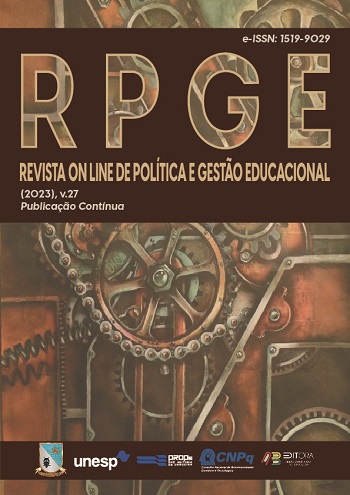Flipped classroom as an innovative technology for blended learning of professional english in higher education institutions
DOI:
https://doi.org/10.22633/rpge.v27i00.18526Keywords:
Blended learning, English, Flipped classroom, Students, TeachersAbstract
This article provides an overview of research on the concept of blended learning, its characteristics, and perspectives on its use in teaching English language teaching in higher education. The paper presents the results of a pedagogical experiment involving the integration of flipped classroom technology into the learning process and demonstrates its effectiveness in teaching professional English. The article's authors conclude that using flipped classroom technology in teaching the “Professional English” course can become an effective tool for a university teacher. It is advisable to integrate it into the educational process to ensure the delivery of quality educational services, create real opportunities to improve students' professional training, personalize the educational process, and align it with the needs of each student, regardless of their initial level of activity.
Downloads
References
CHEN, J.; TAN, J.; LEI, J. Exploring learner identity in the blended learning context: A case study of collaborative writing. System, v. 108, 102841, 2022. DOI: 10.1016/j.system.2022.102841.
DANGNGUYEN, L. Management of educational accreditation in the context of an education innovation: Theoretical issues and requirements. Nuances: Estudos Sobre Educação, v. 33, n. 00, e022005, 2022. DOI: 10.32930/nuances.v33i00.9483.
DE BRITO LIMA, F.; LAUTERT, S. L.; GOMES, A. S. Contrasting levels of student engagement in blended and non-blended learning scenarios. Computers & Education, v. 172, 104241, 2021. DOI: 10.1016/j.compedu.2021.104241.
GASPARIAN, M. et al. Conceptual model of a smart integrated educational environment. Wisdom, v. 4, n. 3, p. 32–39, 2022. DOI: 10.24234/wisdom.v4i3.911.
GLADILINA, I. P. et al. Use of information and computer-based distance learning technologies during COVID-19 active restrictions. International Journal of Advanced Computer Science and Applications, v. 13, n. 6, n. 748–753, 2022. DOI: 10.14569/IJACSA.2022.0130688.
HARIADI, B. et al. Higher order thinking skills based learning outcomes improvement with blended web mobile learning model. International Journal of Instruction, v. 15, n. 2, p. 565–578, 2022. DOI: 10.29333/iji.2022.15231a.
HE, X.; SINGH, C. K. S.; EBRAHIM, N. A. Quantitative and qualitative analysis of higher-order thinking skills in blended learning. Perspektivy nauki i obrazovania [Perspectives of Science and Education], v. 59, n. 5, p. 397–414, 2022. DOI: 10.32744/pse.2022.4.23.
KRAVCHENKO, O. et al. Productivity in higher education institutions within digitalization. Interacción y Perspectiva, v. 11, n. 2, p. 154–169, 2021.
MEDESHOVA, А. et al. Distance learning activation in higher education. European Journal of Contemporary Education, v. 11, n. 3, p. 831–845, 2022. DOI: 10.13187/ejced.2022.3.831.
NIKIPORETS-TAKIGAWA, G.; SKORODUMOVA, O.; MELIKOV, I. New needs of Russian higher education in the digital age. Revista Conrado, v. 18, n. 88, p. 285–290, 2022.
ONG, A. K. S. et al. Preference analysis on the online learning attributes among senior high school students during the COVID-19 pandemic: A conjoint analysis approach. Evaluation and Program Planning, v. 92, 102100, 2022. DOI: 10.1016/j.evalprogplan.2022.102100.
PIVNEVA, S. et al. Raising the level of motivation of economics students for studying english using the Myenglishlab Blended Learning Platform. Revista Conrado, v. 19, n. 90, p. 270–276, 2023.
RAMAZANOVA, D. et al. Using Instagram to raise the effectiveness of distance learning in English: The experience of Kazakhstani students. Frontiers in Education, v. 7, 923507, 2022. DOI: 10.3389/feduc.2022.923507.
SOKOLOVSKAYA, I. E. et al. Educational and professional motivation of students with various religious orientations. European Journal of Science and Theology, v. 16, n. 4, p. 169–180, 2020.
TOGAIBAYEVA, A. et al. Effect of mobile learning on students’ satisfaction, perceived usefulness, and academic performance when learning a foreign language. Frontiers in Education, v. 7, 946102, 2022. DOI: 10.3389/feduc.2022.946102.
TOLMACHEV, M. et al. Development of students’ digital competence when using the “Oracle” electronic portal. European Journal of Contemporary Education, v. 11, n. 4, p. 1261–1270, 2022. DOI: 10.13187/ejced.2022.4.1261.
TONG, D. H.; UYEN, B. P.; NGAN, L. K. The effectiveness of blended learning on students' academic achievement, self-study skills and learning attitudes: A quasi-experiment study in teaching the conventions for coordinates in the plane. Heliyon, v. 8, n. 12, e12657, 2022. DOI: 10.1016/j.heliyon.2022.e12657.
TRUSS, A.; ANDERSON, V. The navigational challenges of a blended learning approach to teaching in business and management. The International Journal of Management Education, v. 21, n. 1, 100733, 2023. DOI: 10.1016/j.ijme.2022.100733.
YAKHAYEVA, A.; MUSKHANOVA, I. Dissemination of pedagogical practices to build the success of young teachers in Russia. Conhecimento & Diversidade, v. 13, n. 34, p. 303–309, 2022.
YAROSLAVOVA, E. N.; KOLEGOVA, I. A.; STAVTSEVA, I. V. Flipped classrom blended learning model for the development of students’ foreign language communicative competence. Perspektivy nauki i obrazovania [Perspectives of Science and Education], v. 43, n. 1, p. 399–412, 2020. DOI: 10.32744/pse.2020.1.29.
Published
How to Cite
Issue
Section
License
Copyright (c) 2023 Revista on line de Política e Gestão Educacional

This work is licensed under a Creative Commons Attribution-NonCommercial-ShareAlike 4.0 International License.
Manuscritos aceitos e publicados são de propriedade da Revista on line de Política e Gestão Educacional. É vedada a submissão integral ou parcial do manuscrito a qualquer outro periódico. A responsabilidade do conteúdo dos artigos é exclusiva dos autores. É vedada a tradução para outro idioma sem a autorização escrita do Editor ouvida a Comissão Editorial Científica.











